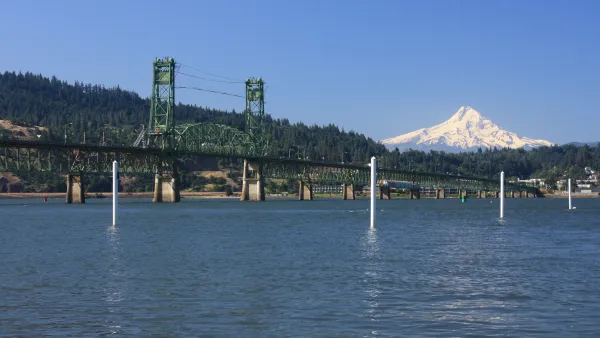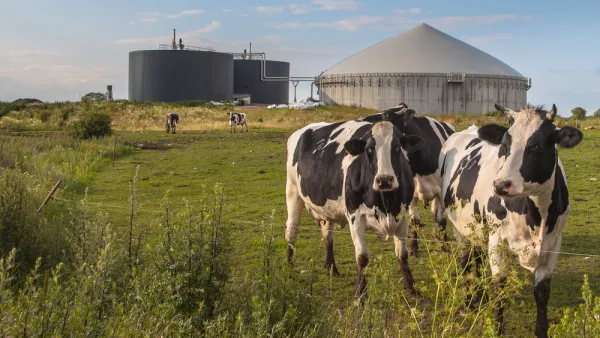Oregon may end its low carbon fuel standard, one of two in the nation, to increase the gas tax by four cents and implement a bevy of clean fuel alternatives to replace the three-month-old clean fuels program.
"Gov. Kate Brown's office and eight legislators agreed to repeal Oregon's clean fuels program as part of a deal to raise $200 million a year for transportation projects, according to details leaked [June 18] to The Oregonian/OregonLive," writes Oregonian government reporter Ian K. Kullgren in a series of articles on the controversial program and the related transportation dealmaking.
The agreement confirms, however, that Brown and some Democrats agreed to withdraw a law she signed only three months ago — March 12 — and that Democrats ultimately gave way to resolve a partisan standoff over the program.
The new governor, sworn into office on Feb. 18 to replace Gov. John Kitzhaber, has quickly shown that she is willing to retract laws she likes if the deal is right, and the agreement worked-out by the "gang of eight" was agreeable to her, particularly because it resolved "a partisan standoff over the [Clean Fuels] program."
On March 12, Brown signed Senate Bill 324, the Low-Carbon Fuel Standard, also known as Oregon Clean Fuels Program, that required oil suppliers "to progressively lower the amount of carbon their oil and gas products could emit," wrote Kullgren in an earlier piece describing the program. Upon signing the bill, she stated:
"I strongly support SB 324's goal to reduce greenhouse gas emissions. It is difficult to deny that we are seeing the effects of a warming planet. This year, 85 percent of our state is experiencing drought, with 33 percent experiencing extreme drought."
However, lowering the carbon content "is estimated to increase gas prices by 4 to 19 cents a gallon," writes Kullgren, causing Republicans to hold firm against a needed gas tax increase to finance infrastructure improvements.
Environmentalists blasted the bipartisan deal, arguing that "the new carbon plan lets oil distributors off the hook, leaving taxpayers to pick up the tab," writes Kullgren. However, he adds that "according to Oregon Department of Environmental Quality estimates — the plan would reduce the state's carbon emissions by 8.5 million metric tons over 10 years, slightly higher than the 10 percent reduction outlined in the clean fuels program."
The agreement reached by the four Republicans and four Democrats includes seven bullet points, including:
- It would repeal the clean fuels standard and replace it with a new biofuel-blending program. Under the new plan, fuel distributors would be required to buy any available fuel that the state Department of Agriculture determined would have a lower carbon impact, be safe for engines, and not cost more.
- It would increase gasoline taxes, over two years, by four cents to 34 cents a gallon. That would produce an estimated $200 million a year for transportation projects. The group had not decided how the money would be spent but referred to a list of projects from the Oregon Department of Transportation.
"Lawmakers, with the session set to end by July 11, are racing the clock," writes Kullgren on June 23. "And because the legislation contains tax increases, it must get approval from a three-fifths 'supermajority' in both chambers."
FULL STORY: Transportation deal revealed: Lawmakers agreed to ax clean fuels for road fixes, documents show

Analysis: Cybertruck Fatality Rate Far Exceeds That of Ford Pinto
The Tesla Cybertruck was recalled seven times last year.

National Parks Layoffs Will Cause Communities to Lose Billions
Thousands of essential park workers were laid off this week, just before the busy spring break season.

Retro-silient?: America’s First “Eco-burb,” The Woodlands Turns 50
A master-planned community north of Houston offers lessons on green infrastructure and resilient design, but falls short of its founder’s lofty affordability and walkability goals.

Test News Post 1
This is a summary

Analysis: Cybertruck Fatality Rate Far Exceeds That of Ford Pinto
The Tesla Cybertruck was recalled seven times last year.

Test News Headline 46
Test for the image on the front page.
Urban Design for Planners 1: Software Tools
This six-course series explores essential urban design concepts using open source software and equips planners with the tools they need to participate fully in the urban design process.
Planning for Universal Design
Learn the tools for implementing Universal Design in planning regulations.
EMC Planning Group, Inc.
Planetizen
Planetizen
Mpact (formerly Rail~Volution)
Great Falls Development Authority, Inc.
HUDs Office of Policy Development and Research
NYU Wagner Graduate School of Public Service



























